|
|
|
Sort Order |
|
|
|
Items / Page
|
|
|
|
|
|
|
| Srl | Item |
| 1 |
ID:
158991
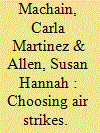

|
|
|
|
|
| Summary/Abstract |
Under what conditions do states choose to use only air power? Air strikes are one of many tools states use to promote their interests in the international system. Given that not all policy tools are appropriate for all crises, we explore when states choose to use air strikes as a coercive tool. We empirically test both common perceptions and newly derived hypotheses on the characteristics of states that employ air-only campaigns and the settings in which they do so, using newly collected data on the uses of air power during international crises between 1908 and 2006. Looking at the events that trigger the crises and the salience of the issues at stake, alongside the characteristics of the states involved, provides a clearer picture of when states use air power versus other coercive tools. Our research indicates that air-only campaigns are more likely to be initiated by militarily powerful states, but that in higher stakes crises, states are more likely to use ground troops or ground and air forces in combination.
|
|
|
|
|
|
|
|
|
|
|
|
|
|
|
|
| 2 |
ID:
162774
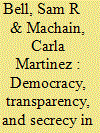

|
|
|
|
|
| Summary/Abstract |
Why is it that some democracies are able to effectively engage in secrecy and mobilize their forces privately, while others are unable to keep enough information secret to effectively carry out such an attack? Recent work by Colaresi (2014) suggests that a democracy's ability to keep information secret depends on its retrospective oversight institutions, which allow democracies to keep information secret in the present with the promise of revealing it to the public in the future. Though Colaresi (2014) finds that states with retrospective oversight have greater military spending, more support for military action, and more success in crises, to our knowledge there has yet to be empirical support for the argument that democracies with greater retrospective oversight can actually conduct foreign policy with greater opacity than those without retrospective oversight. In this research note we empirically explore this question, using data on private mobilizations by democracies with varying levels of retrospective oversight. This gives us greater insight into strategic military choices and shows how military effectiveness can be affected by political institutions.
|
|
|
|
|
|
|
|
|
|
|
|
|
|
|
|
| 3 |
ID:
106272
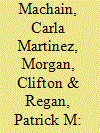

|
|
|
|
|
| Publication |
2011.
|
| Summary/Abstract |
Global terrorism and local rebellion are observed rather frequently; solutions appear to be rather sparse. A common strategy adopted by governments is to attempt to deter potential rebels from engaging in acts of violence, often by responding to attacks with violent reprisals directed at the populace from which the rebels are recruited. The logic supporting such a strategy follows from a theory of deterrence that we believe is underdeveloped. This theory focuses heavily on the credibility of the deterrent threat and on ensuring that the cost imposed by retaliation is high. This ignores the flip side of the deterrent threat-that is, the promise that if one does not misbehave (by engaging in acts of rebellion), one will not suffer retaliatory punishment. Policy designed to ensure that punishment is swift and severe (and perhaps disproportional) can undermine deterrence and actually encourage more potential rebels to become active. Using a game-theoretic model, we show that successful deterrence requires a strategy in which retaliation is proportionate and directed only at the guilty, as well as being certain. Moreover, potential rebels must believe that the innocent will have attractive opportunities outside of joining the insurgency as well as that the innocent will not be punished. We provide empirical illustrations of our thesis from participants in the Palestinian uprising, including several who have taken up arms against Israel.
|
|
|
|
|
|
|
|
|
|
|
|
|
|
|
|
| 4 |
ID:
154847


|
|
|
|
|
| Summary/Abstract |
This article studies whether the pursuit of counterterrorism militarizes foreign aid flows. It focuses on the case of US foreign aid to sub-Saharan African states, which recently have experienced an increase in the presence of al-Qaeda or its affiliate terrorist organizations. This article argues that as terrorist groups carry out attacks inside a state’s territory, aid towards that state will serve such counterterrorism goals. For one, the state’s executive branch will receive increased military aid to immediately fight al-Qaeda or affiliates. For the other, the United States also steps up aid for civil society and development, which could over time undermine al-Qaeda’s mobilization and recruitment efforts. In an empirical analysis that covers 46 African states from 1996 to 2011, our results largely corroborate the hypothesized patterns for attacks that occur on a country territory and in the neighborhood. We note, though, that the overall composition of aid shifts relative to the military when there are direct attacks, something that does not occur when attacks happen in the neighborhood only. Our article concludes that concerns about militarization of aid are warranted, but that actual manifestations are nuanced.
|
|
|
|
|
|
|
|
|
|
|
|
|
|
|
|
| 5 |
ID:
117623
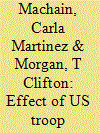

|
|
|
|
|
| Publication |
2013.
|
| Summary/Abstract |
Major powers often deploy troops abroad with the consent of host states. The stated aim of these deployments is often both to protect the host state and to foster stability in the region. Drawing from an extension of Palmer and Morgan's two-good theory of foreign policy, the authors explore some of the (perhaps unintended) effects of troop deployments abroad on the foreign policies of the host states. In particular, the authors focus on the effects of US deployments. The authors argue that as the number of US troops deployed to a host state increases, we should expect the host state to reduce its own troop levels, be more likely to initiate militarized interstate disputes, and be less likely to be the target of interstate disputes. The authors test these hypotheses using data on US troop deployments abroad from 1950 to 2005 and discuss implications that their findings may have for US foreign policy.
|
|
|
|
|
|
|
|
|
|
|
|
|
|
|
|
| 6 |
ID:
156533
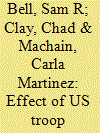

|
|
|
|
|
| Summary/Abstract |
US noninvasion troops deployed abroad often try to promote greater respect for human rights in the host country. The host country, having an incentive to retain the troop presence, may choose to comply with these requests. We argue that this effect will not be at play in states with high security salience for the United States (US) (for which the US may not be able to credibly threaten to remove the troops). In these cases, US deployments will provide the leader with security from both internal and external threats that is independent of the local population’s support for the leader. Host state leaders thus become less reliant on (and potentially less responsive to) their local populations, which in turn may lead to increased human rights violations. In this article, we use data on both US troop deployments abroad and on human rights violations to test these arguments from 1982 to 2005.
|
|
|
|
|
|
|
|
|
|
|
|
|
|
|
|
| 7 |
ID:
177021


|
|
|
|
|
| Summary/Abstract |
The US engages in extensive training and education of foreign militaries, often through exchange programs carried out at the different military services’ staff and war colleges. Researchers have recently explored the way in which military training can affect civil-military relations in the host country, but not much work has studied whether military training actually leads to increased US influence in these states. This paper proposes a soft-power theoretical framework to argue that foreign military training can create affinity for the U.S. that can in turn result in more pro-U.S. voting behavior in the UN General Assembly. It further expands on the military training literature by distinguishing between different military training programs.
|
|
|
|
|
|
|
|
|
|
|
|
|
|
|
|
| 8 |
ID:
134458


|
|
|
|
|
| Summary/Abstract |
This article attempts to answer the question of why major powers engage in more active foreign policy behaviors than minor powers. It does so by comparing two explanations for the increased conflict propensity of major powers. The first explanation focuses on major powers’ observable capabilities, while the second stresses their different behavior. We incorporate both into an ultimatum model of conflict in which a state’s cost of conflict consists of both observable and behavioral components. Using data from the period from 1870 to 2001, we empirically illustrate the observable and behavioral differences between major and minor powers. We then utilize a decomposition model to assess the relative significance of the two explanations. The results suggest that most of the difference in conflict propensity between major and minor powers can be attributed to observable differences.
|
|
|
|
|
|
|
|
|
|
|
|
|
|
|
|
|
|
|
|
|